The 7 Best Omega-3 Supplements, According to Dietitians
Dotdash Meredith and Yahoo Inc. may earn commission or revenue on some items through the links below.
From soft gels to gummies to liquids, these seven supplements will help you increase your omega-3s
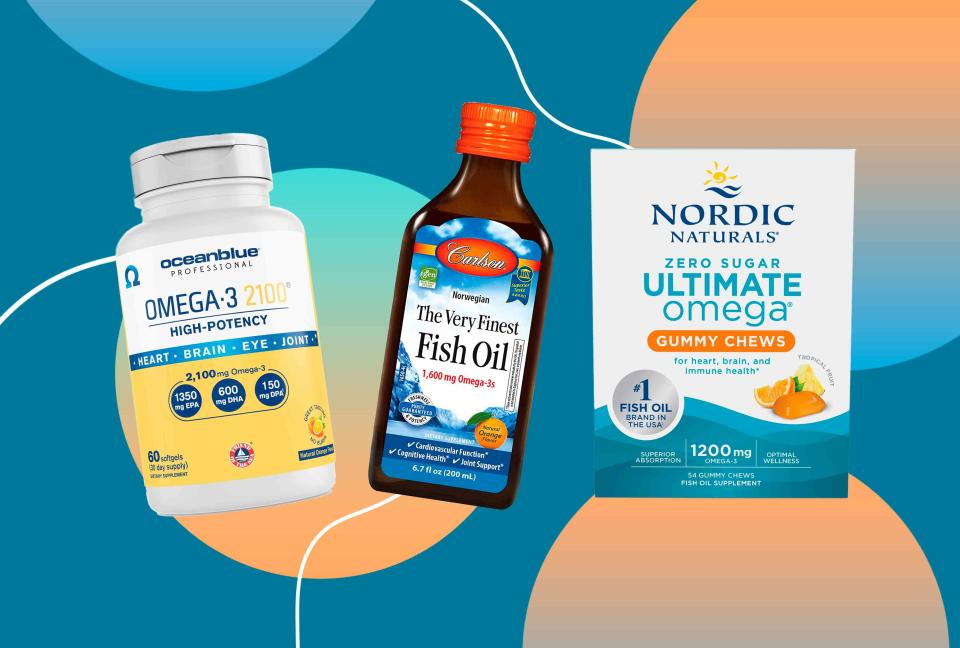
Courtesy of Brand
Reviewed by Dietitian Brierley Horton, M.S., RD
Only ten percent of us eat the amount of seafood we should (that’s right, 90 percent of us fall short!). We all should be eating at least two servings of seafood, specifically fatty fish, per week according to the American Heart Association.
Fatty fish such as salmon, sardines, herring and mackerel are top sources of omega-3 fatty acids, which are essential nutrients that support the health of our heart, skin, brain, eyes and immune system—making it that much more important to meet our goals.
If fish isn't on your plate every week, you'll want to consider taking a fish oil or omega-3 supplement to help bridge those nutritional gaps. Sports dietitian Christopher Mohr, Ph.D., RD recommends a supplement with a minimum of 500 milligrams combined EPA and DHA for general health. To find the best omega-3 supplements, we spoke to Mohr and Dawn Jackson Blatner, RDN and NOW wellness expert, for insights into what to look for in a quality softgel, gummy or oil.
Our Top Recommendations
Best Overall: Nordic Naturals Ultimate Omega 2X
Also Great: OceanBlue Professional Omega-3 2100
Best Softgel: NOW Ultra Omega-3 (Fish Gelatin) Fish Softgels
Best Gummy: Nordic Naturals Ultimate Omega Gummy Chews
Best Liquid: Carlson's The Very Finest Fish Oil
Best Vegan: OceanBlue Professional Omega-3 1300 Vegan
Best for Kids: Barlean's Omega Pals High Potency Fish Oil
Related: How We Decide Which Supplements To Recommend
Omega-3 Supplements vs. Fish Oil Supplements
All fish oil supplements contain omega-3 fatty acids, but not all omega-3 supplements are derived from fish oil. Here's why:
"All fish oil provides the omega 3s EPA and DHA, but EPA (eicosapentaenoic acid) and DHA (docosahexaenoic acid) can also come from other sources, particularly algae," Mohr says. "And EPA and DHA are the important components of omega 3s as a whole, meaning when you're looking at fish oil supplement labels, you want to make sure you're looking at those two numbers, adding them up, then using that when determining your dose," he says.
Best Overall: Nordic Naturals Ultimate Omega 2X
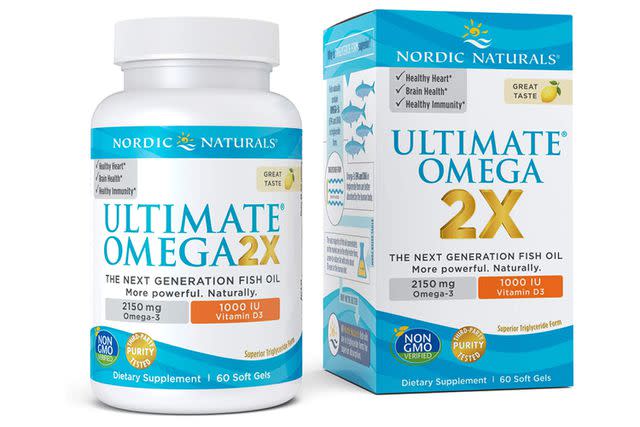
Amazon
Serving size: 2 capsules | EPA: 1,125 mg | DHA: 875 mg | Third-party tested: Yes
What we like: The brand is super transparent about where it sources its omega-3s from and provides a certificate of analysis (COA) that attests to the product's purity and quality.
What to know: It's expensive, coming in at about $1.70 a serving.
Nordic Naturals Ultimate Omega 2X provides 1,125 mg of EPA and 875 mg of DHA from wild-caught anchovies and sardines. It contains a total of 2,150 mg of omega-3s in a two-capsule serving to help support total-body health. One study—published in JAHA—found that taking between 2,000 and 3,000 mg of omega-3s per day may help lower blood pressure.
We also love that this high-dosage pill is lemon-flavored, so you won't get any fishy burps or aftertaste while taking these.
Nordic Naturals sets itself apart from competitors by being extra transparent about where it sources its fish oil, and their fish oil is certified sustainable by the reputable organization Friend of the Sea (FOS). Each product comes with a certificate of analysis (COA) that shows a third party tests the supplement for purity, potency and freshness, so you know that it’s free of contaminants like PCBs and heavy metals. Also, anchovies and sardines are naturally lower in mercury compared to other oily fish that are larger. To pull up your bottle's COA, simply look up its lot number on the Nordic Naturals website.
Also Great: OceanBlue Professional Omega-3 2100
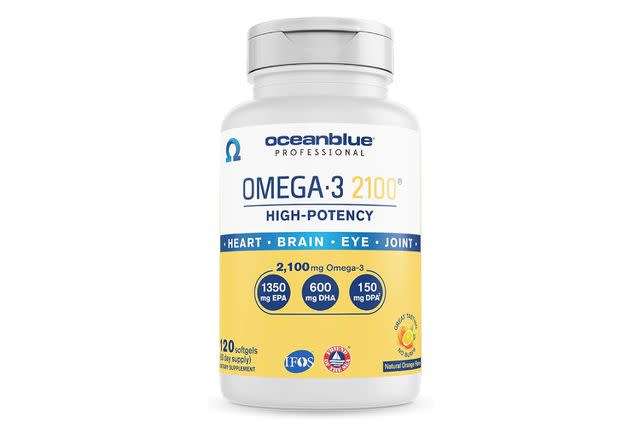
Amazon
Serving size: Two capsules | EPA: 1,350 mg | DHA: 600 mg | Third-party tested: Yes
What we like: It provides a high dose of omega-3s and is produced in a cGMP facility.
What to know: The brand states that the product is free of toxins like PCBs and heavy metals, but doesn't provide a COA.
OceanBlue Professional Omega-3 2100 is another supplement that delivers a therapeutic dose of omega-3s, which is why we recommend it. You'll get 1,350 mg EPA and 600 mg DHA in just two convenient capsules. OceanBlue produces its supplements in a facility that adheres to Current Good Manufacturing Practices (cGMP), which are enforced by the FDA and assures the products' strength, quality and purity. OceanBlue products are free of heavy metals, PCBs and other toxins. In fact, OceanBlue's parent company KD Pharma undergoes third-party testing and recently achieved first place in the AOCS Laboratory Proficiency Program for GOED Nutraceutical Oils, which confirms the oils in these supplements are of top quality.
For such a high-dosage supplement, this pick is budget-friendly, coming in at less than a dollar per serving. The pills boast a natural orange flavor, which helps minimize the fishy aftertaste and burps that often come along with fish oil supplements. You'll take two softgels daily with meals.
Best Softgel: NOW Ultra Omega-3 (Fish Gelatin) Fish Softgels
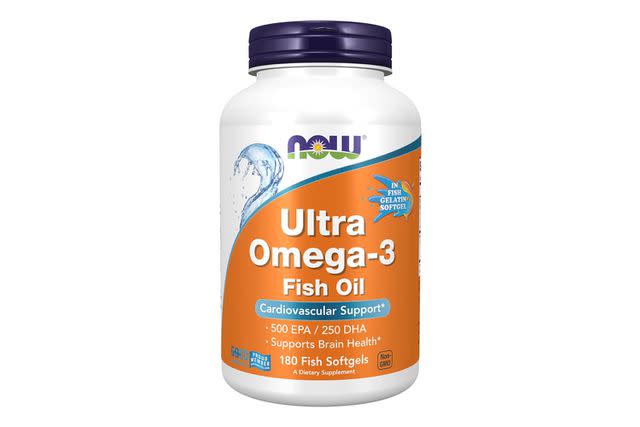
Amazon
Serving size: One capsule | EPA: 500 mg | DHA: 250 mg | Third-party tested: Yes
What we like: This soft gel is made with a fish gelatin coating (versus gelatin from cows or pigs), so it’s a great option for pescatarians.
What to know: Other supplements contain a higher dosage of EPA and DHA.
We love that NOW supplements are backed by a handful of certifications that attest to the brand's quality. The Ultra Omega-3 supplement is produced in a cGMP facility and certified by both Underwriters Laboratories (UL), which tests supplements and validates their ingredient claims about supplement ingredients, and the Global Organization for EPA and DHA (GOED), which sets high standards to ensure omega-3 products are free of harmful levels of toxins and contaminants.
The fish oil is sourced from anchovies and sardines, two naturally low-mercury fish that are high in omega-3s. These soft gels are made with a fish gelatin coating instead of gelatin sourced from cows or pigs, so they're a great option for pescatarians. They also contain some lemon oil to help mask the fishy flavor. Although the serving size on the bottle is one softgel daily, you can take two per day for a more therapeutic dosage.
Best Liquid: Carlson's The Very Finest Fish Oil
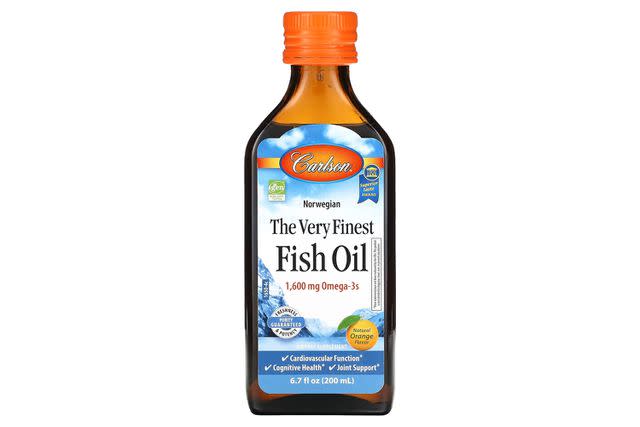
iHerb
Serving size: 1 teaspoon | EPA: 800 mg | DHA: 500 mg | Third-party tested: Yes
What we like: It comes in four different flavors and won an award for its great taste; plus, it's made with sustainably sourced fish.
What to know: Each teaspoon contains 40 calories, which is a bit higher than what you'd get from a softgel.
If you're not a fan of swallowing soft gels, Mohr recommends Carlson's liquid omega-3 supplement as a great alternative that doesn't taste fishy. It comes in four different flavors—Lemon, Orange, Mixed Berry and Just Peachie. A teaspoon is a single serving and contains 800 mg from EPA and 500 mg of DHA from wild-caught and sustainably sourced anchovies, sardines and mackerel. It also contains 45 percent of your daily value (DV) of vitamin E, a nutrient that supports skin and brain health.
Carlson's The Very Finest Fish Oil is third-party-tested in an FDA-registered lab for freshness, potency and purity, and certified by IFOS (the International Fish Oil Standards Program), which is an independent testing and certification program that sets high standards for purity, effectiveness and freshness globally. This product is also free of GMOs and certified by the GMO evaluation program IGEN as well as FOS, which ensures the fish oil is sustainably sourced.
Best Gummy: Nordic Naturals Ultimate Omega Gummy Chews
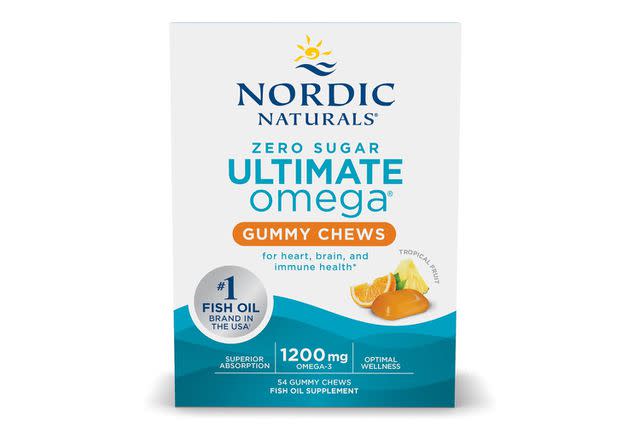
Amazon
Serving size: 2 gummies | EPA: 600 mg | DHA: 450 mg | Third-party tested: Yes
What we like: They contain zero sugar and provide a high dose of omega-3s in an easy-to-take gummy form.
What to know: These gummies are sweetened with xylitol, erythritol and stevia.
An alternative for folks who aren't fans of softgels, these tropical fruit-flavored gummies taste great and are easy to take every day. Two gummies make a single serving, and they contain 600 mg of EPA and 450 mg of DHA sourced from anchovies and sardines. "Many gummies don't provide high levels of EPA and DHA, but this one is different and is one of—if not the—highest dose of omega 3s in any gummy," Mohr says.
While gummy supplements are typically high in added sugar, these are sweetened with zero-calorie xylitol, erythritol and stevia—and each two-gummy serving only has 15 calories, coming entirely from the fats in the fish oil. These zero-sugar gummies taste great and don't cause belching.
Best Vegan: OceanBlue Professional Omega-3 1300 Vegan
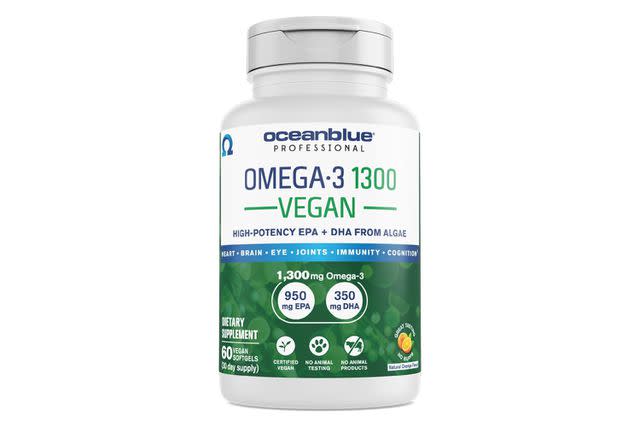
Amazon
Serving size: 2 softgels | EPA: 950 mg | DHA: 350 mg | Third-party tested: Yes
What we like: It contains the highest EPA and DHA concentration in a vegan omega-3 supplement.
What to know: It's pricey compared to other omega-3 supplements, coming in at about $1.60 per serving.
Fish get their omega-3 content from the algae they eat, so if seafood isn't part of your menu, you can go straight to the source with a vegan algae-based omega-3 supplement. OceanBlue Professional Omega-3 1300 Vegan has the highest potency of any algae-based supplements on the market with 950 mg of EPA and 350 mg of DHA per serving. "For those who don't want to take fish oil, this vegan option offers significantly higher doses of EPA and DHA compared to many others," Mohr says, adding that it was also awarded the 2023 Nutraingredients Winner for its innovation and quality.
OceanBlue harvests its microalgae from sustainable sources, the supplement is made per cGMP standards and is free of heavy metals, PCBs and other toxins. Remember, OceanBlue's parent company KD Pharma Group also achieved first place in the AOCS Laboratory Proficiency Program for GOED Nutraceutical Oils.
Plus, this supplement is free of gluten, all major allergens and artificial flavors and colors. The capsule coating is vegan, made with modified food starch, carrageenan, vegetable glycerin and sorbitol. Orange oil is added to their formulation to mask the natural seaweed flavor and help prevent fishy burps.
Best for Kids: Barlean's Omega Pals High Potency Fish Oil
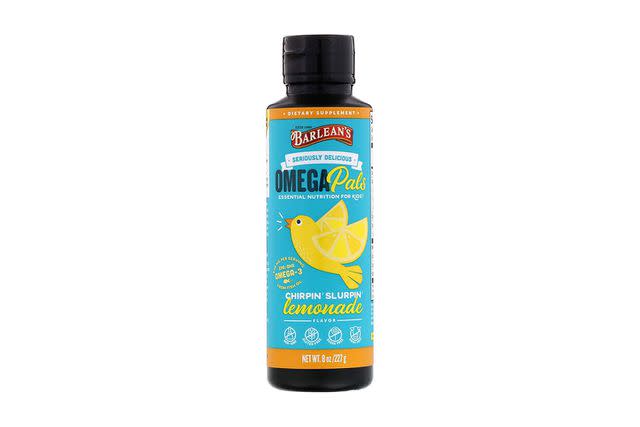
Amazon
Serving size: 1.5 teaspoons | EPA: 455 mg | DHA: 295 mg | Third-party tested: Yes
What we like: It provides about a full day's worth of omega-3s for children and has a sweet, creamy taste that's kid-approved.
What to know: It's sweetened with xylitol, a sugar alcohol, rather than sugar.
Mohr recommends this liquid fish oil from Barlean's for kids because it tastes great, is easy to take, and it provides a high dose of quality omega-3s. It comes in multiple flavors, including a sweet and creamy citrus flavor that almost tastes like a fruit smoothie. It's sweetened with the sugar alcohol xylitol, so this liquid supplement is completely sugar-free, and it’s also dairy-free, gluten-free and non-GMO. You can easily stir it into yogurt, smoothies and oatmeal to sneak some omega-3s into your kid's meals. And it's suitable for children ages 1 and up.
A 1.5 teaspoon serving contains 750 mg of total omega-3s sourced from small fish species like anchovies, sardines and mackerel. Children ages 1 to 3 are recommended to get 700 mg of omega-3s per day while children ages 4 to 8 need around 900 mg. So this tasty supplement can easily get your kids closer to their omega-3 goals. We also love that Barlean's fish oil supplements are third-party tested for purity, potency, toxicity and heavy metals, so you can rest easy giving this to your kid.
The Bottom Line
We love Nordic Naturals Ultimate Omega 2X (view at Amazon) because it's a high-potency product and the brand provides a certificate of analysis for every supplement bottle that attests to the product's purity and quality. We also love OceanBlue Professional Omega-3 2100 (view at Amazon) because it provides a high dose of omega-3s for a cheaper price point than many competitors.
Choosing an Omega-3 Supplement
Select your preferred form
Omega-3 supplements most often come in soft gel, liquid or gummy form. There doesn't appear to be a difference among them in terms of absorption or effectiveness, but rather convenience, Mohr says. "If you're taking a higher dose, liquid might be an easier method of delivery versus swallowing a whole lot of capsules, whereas some may prefer gummies or pills."
That said, cod liver oil and fish oil have come a very long way in terms of freshness, purity and quality, so you should avoid getting fishy burps with liquid products.
Check the type of omega-3s
There are three main different types of omega-3 fats: DHA, EPA and ALA. DHA and EPA are the two found naturally in fish and algae, while ALA is found in some plant sources such as flaxseed oil, chia seeds, walnuts, canola oil and edamame.
All of these omega-3 fats are essential, meaning we need to get them from the diet as we don't make them in our bodies, but EPA and DHA are the two with the most data (with more than 40,000 studies and 4,000+ on humans) on their health benefits, Mohr says.
Our bodies ultimately convert ALA into EPA and then to DHA and EPA in the liver, but our bodies aren't so great at this—less than 15 percent of the ALA is converted into DHA and EPA.3 EPA and DHA are also the two omega-3 fats we're not eating enough of, Mohr says, which is why it's important to look for an omega-3 supplement that offers both EPA and DHA.
Look at the concentration
The DHA and EPA concentration you look for in an omega-3 supplement really depends on the goal. "Both EPA and DHA are beneficial and are readily incorporated into cellular structures to support a healthy body," Mohr says. EPA tends to be more beneficial for heart health whereas DHA seems to be more eye and brain health, though there's certainly overlap between them both. "Think EPA neck down, DHA neck up," Mohr says.
The focus of omega-3 supplements should be the EPA and DHA concentrations. "When you look at an omega-3 supplement label, you want to see what total EPA and DHA content are, not just the 'Total Omega 3s' on the label itself," Mohr says. "I always suggest people look at the label, add the EPA and DHA, and these two numbers should ideally be at least half the total," Mohr says. So if the total number is 1,000 mg, EPA and DHA should be at least 500 mg.
There's some data around omega-3s helping mood and depression, suggesting at least 1 gram (or 1,000 mg) daily should come from EPA, says Mohr. But for general health, a lower dose can be effective. The GOED, along with other organizations, suggests a minimum of 500 mg of combined EPA and DHA for general health.
Identify the fish oil source
There are a variety of omega-3 sources that are either fish- or plant-derived. If you're opting for a fish oil specifically, sardines, anchovies, cod, salmon, mackerel and herring are all common sources, Mohr says. These fish are also small species and naturally contain lower mercury than other fish that may feed on these tiny swimmers and accumulate more mercury.
You might also see krill oil supplements sold online and in stores. Krill are shrimp-like crustaceans that are a natural source of omega-3 fats. "Krill oil became popular several years ago, but krill are not only significantly lower in EPA and DHA but there are also significant concerns around their sustainability with some large retailers no longer even carrying products with krill because of this concern," Mohr says. While some experts believe krill-derived omega-3s have better bioavailability, their lower EPA and DHA levels make them a more expensive yet less effective way to get higher intakes of omega-3s, Mohr says.
Vegan products usually include algae as a source, which is where the fish themselves get omega-3 fats from. Algae-based omega-3 supplements are a great alternative for vegans, people with fish allergies and those with other dietary restrictions.
Seek out third-party testing
Most fish oil supplements sold on the market today are tested extensively by internal and external labs for omega-3 EPA and DHA content, oxidation, heavy metals and persistent organic pollutants, among others. There are a handful of third-party testing methods to ensure quality. GOED is one organization that has pledged to meet its high-quality standards for omega-3 supplements and has put out the GOED monograph, which establishes the quality and potency parameters required for fish oil supplements sold globally, Mohr says. Some other common third-party certifying organizations include Informed Choice, NSF, IFOS, and FOS.
Ingredients
Some omega-3 supplements may include added nutrients and ingredients, such as COQ10, turmeric, vitamin D or vitamin E. While you can certainly opt for a supplement with any of these added benefits, "that's need-dependent and the focus here should be EPA and DHA," Mohr says.
Our Search for the Best Omega-3 Supplement
We researched countless brands of fish oil and omega-3 supplements and interviewed two registered dietitians for the products they love and what to look for in a quality omega-3 supplement. The products on our list are all produced in a cGMP facility and are free of toxins such as heavy metals like mercury. We also prioritized products certified by an independent organization that checks for purity and potency.
Common Questions
Should you take an omega-3 supplement every day?
Four out of five adults do not eat the recommended two servings of fish per week, so supplements can be a great way to bridge the gap in what people aren’t getting from their diet. "If someone chooses to take a fish oil, the recommendation is to take it daily with meals," Blatner says. "Skipping a day or two isn’t a big deal, but supplements like omega-3 work best when they are taken daily to supply a steady level of the nutrient to the bloodstream."
When is the best time of day to take an omega-3 supplement?
Anytime, as long as it’s with a meal—especially a meal that has fat in it. "Omega-3 supplements are better tolerated when taken with food; and since omega-3 is fat-soluble, it’s best absorbed when there is fat in the meal," Blatner says. Some examples of fat-rich foods include avocado, eggs, olive oil, steak, chicken thighs or legs, nuts and seeds.
What are the benefits of omega-3 supplements?
Heart Health
A 2021 review paper published in The Lancet looking at 38 research studies with nearly 150,000 participants found that omega-3s are linked to a decreased risk of death from heart disease. Omega-3s may also help support healthier cholesterol levels, particularly triglyceride levels, according to a 2023 study in the Journal of the American Heart Association.
Brain Health
A 2023 review paper published in Cureus looked at nine research studies with over 1,300 people and found that omega-3 supplementation was associated with increases in learning, memory and blood flow to the brain.
Muscle Soreness
A small 2021 study in the Journal of the International Society of Sports Nutrition found that supplementing with omega-3s helped decrease muscle soreness associated with exercise in men.
What are the side effects of omega-3 supplements?
Omega-3 supplements are safe for most people, and any associated side effects are usually mild. If you do get side effects, they'll likely be a fishy aftertaste or breath, foul-smelling sweat, headache, and gastrointestinal issues such as nausea, heartburn and diarrhea.
Can I take my omega-3 supplement if the “Best By” date has passed?
If the best-by date on your supplement has passed, you're better off tossing the bottle in the trash. Best-by dates are there for a reason: They indicate that the supplement should remain safe and effective at least through that printed date—so long as it's stored as directed. If the bottle has been open for many months and/or stored in hot, humid conditions (think: in the kitchen cabinet over the stove or in your bathroom), your omega-3 supplement may not keep fresh as long.
Can I give an omega-3 supplement to my pet?
Yes, but you'll want to give your furry friend an omega-3 supplement that's specifically made for pets. This will ensure your dog or cat will get the right dosage; plus, some non-pet supplements are sweetened with xylitol, which is highly toxic to dogs.
Omega-3s offer similar benefits to pets as they do to humans as they've been shown to support dogs' skin and coat, heart health, joint health, and immune system, according to the American Kennel Club. Still, always check with your vet before giving your pet a new supplement.
Our Trusted Expertise
April Benshosan, M.S., has more than 7 years of experience writing and editing nutrition content. And while she is well aware of the benefits of omega-3s and regularly eats seafood, she's only started including an omega-3 supplement in her routine after writing this article. For this article, she consulted with two expert dietitians for their insights on omega-3 supplements:
Christopher Mohr, Ph.D., RD is a sports dietitian and has been working with the omega-3 supplement industry for over 20 years. Most recently, Mohr began consulting for OceanBlue Omega.
Dawn Jackson Blatner, RDN, CSSD is an expert in flexible superfood nutrition and keeps her omega 3 levels up by eating air-fryer salmon bites, dill pickle tuna salad and taking daily krill oil supplements. She is also a NOW wellness expert.
This article was edited and reviewed by Brierley Horton, M.S., RD, senior commerce editor, who has 15 years of experience reporting, writing, and editing nutrition and health content. And although she’s an avid seafood eater, her go-to omega-3 supplement is Nordic Naturals Ultimate Omega Gummy Chews.
Read the original article on Eating Well.

